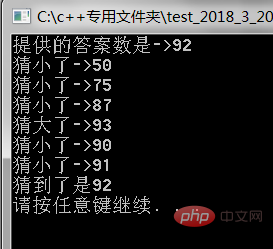 Backend Development
Backend Development
 C#.Net Tutorial
C#.Net Tutorial
 How to generate random numbers from 1 to 100 in C language (with code)
How to generate random numbers from 1 to 100 in C language (with code)
How to generate random numbers from 1 to 100 in C language (with code)

How to generate random numbers from 1 to 100 in C language? I think everyone wants to know about it, so without further ado, let’s learn about it with the editor.
How to generate random numbers in C language
Generate 10 random numbers from 1 to 100
Without further ado, let’s get straight to the program.
#include<stdio.h>#include<stdlib.h>#include<time.h> int main()
{int ret = 0;
srand((unsigned int)time(NULL));for(int i=0; i<p><img src="/static/imghw/default1.png" data-src="https://img.php.cn/upload/image/171/688/281/1593401322583907.png" class="lazy" title="1593401322583907.png" alt="How to generate random numbers from 1 to 100 in C language (with code)"></p>
<p>This program is used to generate 10 random numbers. Next, we will talk about the structure of this program in detail. </p>
<p><strong>Analysis of random number generation code</strong></p>
<p><strong>The key code of the above program is: </strong></p>
<pre class="brush:php;toolbar:false"> srand = ((unsigned)time(NULL));
ret = rand()%100;rand() The header file required for the function is
#include<stdlib.h></stdlib.h>
rand() is a function that generates pseudo-random numbers. It generates random numbers according to a certain sequence, but its sequence is fixed. :

Every time the program is executed, it will give random numbers according to this sequence, so if there are no restrictions on rand(), the random numbers generated will not be random enough. .
The header file required by the time() function is:
#include<time.h></time.h>
time() function. It is worth noting that the formal parameter of the time function is a Pointer variables are usually written as time(NULL).
The function of this function is to return the time from 00:00:00 on January 1, 1970 to the time you first ran it on the computer (for example: 14:14:00 on March 24, 2018). This number is random and changes as your computer runs.
The header file required by the srand() function is:
#include<stdlib.h></stdlib.h>
The srand() function is a pseudo-random number generator seed, which gives the rand() function a generated A starting point. When using the rand() function alone, it takes 1 as the default parameter. The formal parameter of srand() is an unsigned type, that is, unsigned type, which can be int, float, char, etc.
But in order to achieve the random number effect here, the time() function will be used to generate a starting point, which directly acts on the rand() function.
Note:
ret = rand()%100;
rand() 0 is to generate a random number within 100.
Interesting little program
This is a small program for the computer to guess numbers by itself.
#include<stdio.h>#include<time.h>#include<process.h>#include<stdlib.h>#include<windows.h>int main()
{ int ret = 0; int guess = 0; int left = 0; int right = 100;
srand((unsigned int)time(NULL));
ret = rand() % 100; printf("提供的答案数是->%d\n",ret);
guess = 50; while (1)
{ if (guess > ret)
{ printf("猜大了->%d\n", guess);
right = guess;
guess = (right + left) / 2;
Sleep(1000);
} else if (guess %d\n", guess);
left = guess;
guess = (right + left) / 2;
Sleep(1000);
} if (guess == ret)
{ printf("猜到了是%d", guess); break;
}
}
system("pause "); return 0;
}</windows.h></stdlib.h></process.h></time.h></stdio.h>
The idea of dichotomy is used here, allowing the computer to guess a number within 100.
The Sleep() function is used to delay the printing time. The parameter unit of the Sleep() function is ms, so 1000ms=1s.
Thank you for reading
This article is reproduced from: https://blog.csdn.net/H_Strong/article/details/79678269
Recommended tutorial: "C language"
The above is the detailed content of How to generate random numbers from 1 to 100 in C language (with code). For more information, please follow other related articles on the PHP Chinese website!

Hot AI Tools

Undresser.AI Undress
AI-powered app for creating realistic nude photos

AI Clothes Remover
Online AI tool for removing clothes from photos.

Undress AI Tool
Undress images for free

Clothoff.io
AI clothes remover

Video Face Swap
Swap faces in any video effortlessly with our completely free AI face swap tool!

Hot Article

Hot Tools

Notepad++7.3.1
Easy-to-use and free code editor

SublimeText3 Chinese version
Chinese version, very easy to use

Zend Studio 13.0.1
Powerful PHP integrated development environment

Dreamweaver CS6
Visual web development tools

SublimeText3 Mac version
God-level code editing software (SublimeText3)

Hot Topics
 1387
1387
 52
52
 C language data structure: data representation and operation of trees and graphs
Apr 04, 2025 am 11:18 AM
C language data structure: data representation and operation of trees and graphs
Apr 04, 2025 am 11:18 AM
C language data structure: The data representation of the tree and graph is a hierarchical data structure consisting of nodes. Each node contains a data element and a pointer to its child nodes. The binary tree is a special type of tree. Each node has at most two child nodes. The data represents structTreeNode{intdata;structTreeNode*left;structTreeNode*right;}; Operation creates a tree traversal tree (predecision, in-order, and later order) search tree insertion node deletes node graph is a collection of data structures, where elements are vertices, and they can be connected together through edges with right or unrighted data representing neighbors.
 The truth behind the C language file operation problem
Apr 04, 2025 am 11:24 AM
The truth behind the C language file operation problem
Apr 04, 2025 am 11:24 AM
The truth about file operation problems: file opening failed: insufficient permissions, wrong paths, and file occupied. Data writing failed: the buffer is full, the file is not writable, and the disk space is insufficient. Other FAQs: slow file traversal, incorrect text file encoding, and binary file reading errors.
 C language multithreaded programming: a beginner's guide and troubleshooting
Apr 04, 2025 am 10:15 AM
C language multithreaded programming: a beginner's guide and troubleshooting
Apr 04, 2025 am 10:15 AM
C language multithreading programming guide: Creating threads: Use the pthread_create() function to specify thread ID, properties, and thread functions. Thread synchronization: Prevent data competition through mutexes, semaphores, and conditional variables. Practical case: Use multi-threading to calculate the Fibonacci number, assign tasks to multiple threads and synchronize the results. Troubleshooting: Solve problems such as program crashes, thread stop responses, and performance bottlenecks.
 How to output a countdown in C language
Apr 04, 2025 am 08:54 AM
How to output a countdown in C language
Apr 04, 2025 am 08:54 AM
How to output a countdown in C? Answer: Use loop statements. Steps: 1. Define the variable n and store the countdown number to output; 2. Use the while loop to continuously print n until n is less than 1; 3. In the loop body, print out the value of n; 4. At the end of the loop, subtract n by 1 to output the next smaller reciprocal.
 CS-Week 3
Apr 04, 2025 am 06:06 AM
CS-Week 3
Apr 04, 2025 am 06:06 AM
Algorithms are the set of instructions to solve problems, and their execution speed and memory usage vary. In programming, many algorithms are based on data search and sorting. This article will introduce several data retrieval and sorting algorithms. Linear search assumes that there is an array [20,500,10,5,100,1,50] and needs to find the number 50. The linear search algorithm checks each element in the array one by one until the target value is found or the complete array is traversed. The algorithm flowchart is as follows: The pseudo-code for linear search is as follows: Check each element: If the target value is found: Return true Return false C language implementation: #include#includeintmain(void){i
 C language data structure: the key role of data structures in artificial intelligence
Apr 04, 2025 am 10:45 AM
C language data structure: the key role of data structures in artificial intelligence
Apr 04, 2025 am 10:45 AM
C Language Data Structure: Overview of the Key Role of Data Structure in Artificial Intelligence In the field of artificial intelligence, data structures are crucial to processing large amounts of data. Data structures provide an effective way to organize and manage data, optimize algorithms and improve program efficiency. Common data structures Commonly used data structures in C language include: arrays: a set of consecutively stored data items with the same type. Structure: A data type that organizes different types of data together and gives them a name. Linked List: A linear data structure in which data items are connected together by pointers. Stack: Data structure that follows the last-in first-out (LIFO) principle. Queue: Data structure that follows the first-in first-out (FIFO) principle. Practical case: Adjacent table in graph theory is artificial intelligence
 Troubleshooting tips for processing files in C language
Apr 04, 2025 am 11:15 AM
Troubleshooting tips for processing files in C language
Apr 04, 2025 am 11:15 AM
Troubleshooting Tips for C language processing files When processing files in C language, you may encounter various problems. The following are common problems and corresponding solutions: Problem 1: Cannot open the file code: FILE*fp=fopen("myfile.txt","r");if(fp==NULL){//File opening failed} Reason: File path error File does not exist without file read permission Solution: Check the file path to ensure that the file has check file permission problem 2: File reading failed code: charbuffer[100];size_tread_bytes=fread(buffer,1,siz
 The concept of c language functions and their definition format
Apr 03, 2025 pm 11:33 PM
The concept of c language functions and their definition format
Apr 03, 2025 pm 11:33 PM
C language functions are reusable code blocks, receive parameters for processing, and return results. It is similar to the Swiss Army Knife, powerful and requires careful use. Functions include elements such as defining formats, parameters, return values, and function bodies. Advanced usage includes function pointers, recursive functions, and callback functions. Common errors are type mismatch and forgetting to declare prototypes. Debugging skills include printing variables and using a debugger. Performance optimization uses inline functions. Function design should follow the principle of single responsibility. Proficiency in C language functions can significantly improve programming efficiency and code quality.



